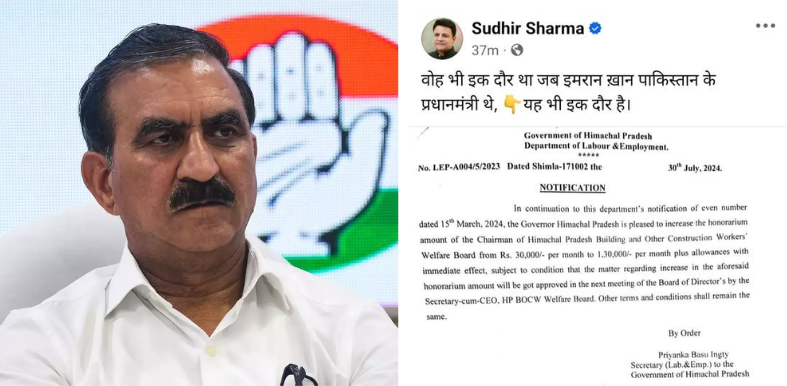Munish Sood
Shimla:- As Himachal Pradesh reels under massive destruction caused by flash floods in Kullu and Mandi districts, Public Works Department (PWD) Minister has issued a heartfelt appeal for a shift towards sustainable development practices in the hill state. His message comes at a time when heavy rains have triggered widespread damage to roads, bridges, homes, and livelihoods, exposing the fragility of the Himalayan ecosystem.
A Wake-Up Call After Recent Floods
The minister acknowledged that “indiscriminate road construction, rising global temperatures, deforestation, and sudden floods” have severely weakened Himachal’s mountains. The devastation in Kullu and Mandi, where connectivity has collapsed due to washed-out bridges and landslides, appears to have prompted his strong words on rethinking development strategies.
“Our mountains, once a symbol of strength, are becoming fragile because of unscientific policies,” he noted, warning that unchecked cutting of hills for road building was destabilizing the natural balance and leading to repeated disasters.
Sustainable Road Building and Afforestation
To address the crisis, the minister announced that all future road projects in the state would require mandatory geological and environmental studies before execution. He emphasized the use of modern techniques that minimize damage to mountain structures.
Afforestation has been placed at the top of his agenda. Every road project will now be linked with compulsory plantation drives, aiming to plant more trees than those felled. Local communities will be involved in these initiatives and incentivized for their participation.
Water Conservation and Traditional Wisdom
The minister stressed the urgent need to revive traditional water storage systems like kuhls, baoris, and village ponds. He proposed that every village be equipped with rainwater harvesting structures to control floods and replenish groundwater.
He also urged citizens to draw lessons from elders who lived in harmony with nature, adopting traditional farming methods that preserved soil fertility without harming the environment.
Community Role in the Green Mission
While outlining government measures, the minister highlighted that success was only possible with people’s participation. He appealed to Himachalis to plant trees around their homes, reduce plastic use, and adopt eco-friendly practices in daily life.
Education too will play a role – with environmental conservation to be introduced as a compulsory subject in schools. Youth, he said, would be offered opportunities in green technologies and sustainable development sectors to secure both jobs and the environment.
Tourism and the Future of Himachal
The minister also underlined the need to reshape Himachal’s tourism industry, calling for a shift towards eco-tourism. Hotels and resorts, he said, must comply with environmental norms, while visitors should be made aware of their responsibility in protecting the fragile Himalayan ecosystem.
“Our Dharma, Our Responsibility”
Concluding his message, the minister declared that the time had come for every citizen to take responsibility for protecting the state’s rivers, mountains, and forests.
“Sustainable development must become a way of life, not just a slogan,” he said. “Together, we can build a Himachal that is both progressive and environmentally secure.”
The message resonates strongly as thousands in Kullu and Mandi face the brunt of nature’s fury, their lives disrupted by collapsing infrastructure and recurring natural calamities. For many, the minister’s vision offers a roadmap to safeguard the state from future devastation.





